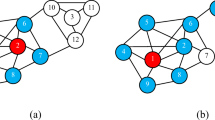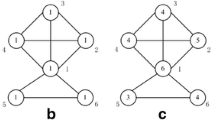Abstract
Depending on the actions and reactions in social networks, the opinions of users may have an impact on each other. Nodes who can impact others’ opinions are defined as opinion leaders. In this paper, we formulate Opinion Leader Selection (OLS) as an optimization problem, for this purpose, African vultures optimization algorithm (AVOA) and Hunger games search (HGS) algorithms are utilized to choose opinion leaders and optimize the results. The proposed method uses the topological characteristics of the network and the combination of relationships between users, also a model that includes four activities, stability, novelty, and popularity features to calculate the fitness function and other required parameters. The Social Network Analysis (SNA) parameters, SIR, and OSim models are used to investigate the proposed method. Based on the findings of the evaluation, the proposed method provides for the Bitcoin alpha dataset (0.88, 0.7, 0.97, 0.81) percent and the Bitcoin OTC dataset (0.76%, 0.64, 0.96, 0.77) percent for accuracy, recall, precision, and F1-score respectively. Also, on the SIR and OSim models analysis, compared to the other 8 approaches, the proposed method gives a better-spreading ability interval and results.















Similar content being viewed by others
Data availability
No datasets were generated or analysed during the current study.
References
Abdollahzadeh B, Gharehchopogh FS, Mirjalili S (2021) African vultures optimization algorithm: a new nature-inspired metaheuristic algorithm for global optimization problems. Comput Ind Eng 158:107408
Aghdam SM, Navimipour NJ (2016) Opinion leaders selection in the social networks based on trust relationships propagation. Karbala Int J Mod Sci 2(2):88–97
Agouti T (2022) Graph-based modeling using association rule mining to detect influential users in social networks. Exp Syst Appl 202:117436
Alizadeh A et al (2023) An improved hybrid salp swarm optimization and African vulture optimization algorithm for global optimization problems and its applications in stock market prediction
Bamakan SMH, Nurgaliev I, Qu Q (2019) Opinion leader detection: a methodological review. Expert Syst Appl 115:200–222
Bartz-Beielstein T et al (2014) Evolutionary algorithms. Wiley Interdiscip Rev: Data Min Knowl Discov 4(3):178–195
Bonacich P (2007) Some unique properties of eigenvector centrality. Soc Netw 29(4):555–564
Bouyer A, Mohammadi M, Arasteh B (2023a) Identifying influential nodes based on new layer metrics and layer weighting in multiplex networks. Knowl Inf Syst. https://doi.org/10.1007/s10115-023-01983-7
Bouyer A et al (2023b) Discovering overlapping communities using a new diffusion approach based on core expanding and local depth traveling in social networks. Int J Gen Syst 52(8):991–1019
Chung W, Zeng D (2020) Dissecting emotion and user influence in social media communities: an interaction modeling approach. Inf Manag 57(1):103108
Ellison NB, Steinfield C, Lampe C (2007) The benefits of Facebook “friends:” social capital and college students’ use of online social network sites. J Comput-Mediat Commun 12(4):1143–1168
Emami M et al (2021) A hybrid constrained coral reefs optimization algorithm with machine learning for optimizing multi-reservoir systems operation. J Environ Manage 286:112250
Feng Z-K, Niu W-J, Liu S (2021) Cooperation search algorithm: a novel metaheuristic evolutionary intelligence algorithm for numerical optimization and engineering optimization problems. Appl Soft Comput 98:106734
François D (2009) Binary classification performances measure cheat sheet. J Mach Learn Res
Freeman LC (1978) Centrality in social networks conceptual clarification. Soc Netw 1(3):215–239
Gharehchopogh FS (2023) An improved Harris Hawks optimization algorithm with multi-strategy for community detection in social network. J Bionic Eng 20(3):1175–1197
Gharehchopogh FS et al (2023) Cqffa: a chaotic quasi-oppositional farmland fertility algorithm for solving engineering optimization problems. J Bionic Eng 20(1):158–183
Hou L (2022) Network versus content: the effectiveness in identifying opinion leaders in an online social network with empirical evaluation. Phys a: Stat Mech Appl 592:126879
Jain L (2022) An entropy-based method to control COVID-19 rumors in online social networks using opinion leaders. Technol Soc 70:102048
Jain L, Katarya R (2019) Discover opinion leader in online social network using firefly algorithm. Expert Syst Appl 122:1–15
Jain S, Sinha A (2020) Identification of influential users on Twitter: a novel weighted correlated influence measure for Covid-19. Chaos Solitons Fractals 139:110037
Jain L, Katarya R, Sachdeva S (2020) Opinion leader detection using whale optimization algorithm in online social network. Expert Syst Appl 142:113016
Kang M et al (2023) Detection of opinion leaders: static versus dynamic evaluation in online learning communities. Heliyon. https://doi.org/10.1016/j.heliyon.2023.e14844
Katz E, Lazarsfeld PF (2017) Personal influence: the part played by people in the flow of mass communications. Routledge
Latif SD et al (2021) Optimizing the operation release policy using charged system search algorithm: a case study of Klang Gates Dam, Malaysia. Sustainability 13(11):5900
Li C et al (2019) Opinion community detection and opinion leader detection based on text information and network topology in cloud environment. Inf Sci 504:61–83
Liu Y et al (2018) Identifying key opinion leaders in social media via modality-consistent harmonized discriminant embedding. IEEE Trans Cybernet 50(2):717–728
Lu F et al (2017) Scalable influence maximization under independent cascade model. J Netw Comput Appl 86:15–23
Mehta P et al (2022) Hunger games search algorithm for global optimization of engineering design problems. Mater Test 64(4):524–532
Nadimi-Shahraki MH et al (2023) MMKE: Multi-trial vector-based monkey king evolution algorithm and its applications for engineering optimization problems. PLoS ONE 18(1):e0280006
Özbay E (2023a) An active deep learning method for diabetic retinopathy detection in segmented fundus images using artificial bee colony algorithm. Artif Intell Rev 56(4):3291–3318
Özbay FA (2023b) A modified seahorse optimization algorithm based on chaotic maps for solving global optimization and engineering problems. Eng Sci Technol Int J 41:101408
Parau P et al (2017) Opinion leader detection. In: Sentiment analysis in social networks, Elsevier, pp 157–170
Powers DM (2020) Evaluation: from precision, recall and F-measure to ROC, informedness, markedness and correlation. arXiv preprint http://arxiv.org/abs/2010.16061
Rashedi E, Nezamabadi-Pour H, Saryazdi S (2009) GSA: a gravitational search algorithm. Inf Sci 179(13):2232–2248
Sheikhahmadi A, Nematbakhsh MA, Shokrollahi A (2015) Improving detection of influential nodes in complex networks. Physica A 436:833–845
Sun G, Bin S (2018) A new opinion leaders detecting algorithm in multi-relationship online social networks. Multimedia Tools and Applications 77(4):4295–4307
Yang Y et al (2021) Hunger games search: Visions, conception, implementation, deep analysis, perspectives, and towards performance shifts. Expert Syst Appl 177:114864
Zareie A, Sheikhahmadi A, Jalili M (2020) Identification of influential users in social network using gray wolf optimization algorithm. Expert Syst Appl 142:112971
Zhang M et al (2023) An exploratory study of Twitter metrics for measuring user influence. J Informet 17(4):101454
Acknowledgements
Thank you very much for reviewing our manuscript. We also greatly appreciate the reviewers for their complimentary comments and suggestions. We have carried out the works that the reviewers suggested and edited the manuscript accordingly.
Author information
Authors and Affiliations
Contributions
All authors wrote and reviewed the manuscript.
Corresponding author
Ethics declarations
Conflict of interest
The authors declare no conflict of interests.
Additional information
Publisher's Note
Springer Nature remains neutral with regard to jurisdictional claims in published maps and institutional affiliations.
Rights and permissions
Springer Nature or its licensor (e.g. a society or other partner) holds exclusive rights to this article under a publishing agreement with the author(s) or other rightsholder(s); author self-archiving of the accepted manuscript version of this article is solely governed by the terms of such publishing agreement and applicable law.
About this article
Cite this article
Aghdam, S.M., Gharehchopogh, F.S. & Masdari, M. A hybrid approach in opinion leaders selection using African vultures optimization and hunger games search algorithms. Soc. Netw. Anal. Min. 14, 60 (2024). https://doi.org/10.1007/s13278-024-01228-7
Received:
Revised:
Accepted:
Published:
DOI: https://doi.org/10.1007/s13278-024-01228-7




